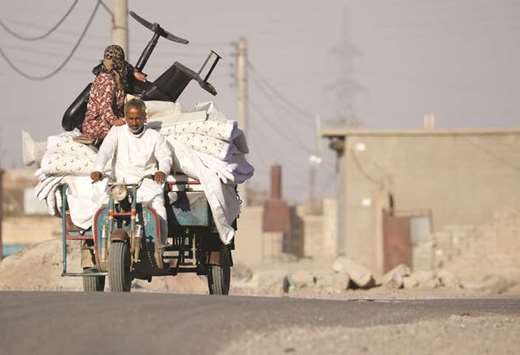The US-backed Syrian Democratic Forces (SDF) are on the verge of seizing full control of the southern neighbourhoods of Islamic State-held Raqqa, a Kurdish official said yesterday.
The US-led coalition said SDF fighters advancing from the east were within 300m of meeting up with those advancing from the west.
The SDF was making “consistent gains” every day, the coalition spokesman said.
On Monday, the World Health Organization said there were critical shortages of medical supplies in Raqqa, where it estimated up to 50,000 civilians remained.
Separately, Medecins Sans Frontieres said many sick and wounded people were trapped.
The SDF launched its US-backed campaign to seize Raqqa in early June.
The assault on Islamic State’s de facto capital in Syria overlapped with the campaign to drive IS from the Iraqi city of Mosul, where IS was defeated last month.
The Kurdish official told Reuters SDF fighters advancing from the east and the west remain separated by a few streets where fighting continued.
Full control of the southern districts would sever Islamic State’s last remaining path to the Euphrates River which is to the south of the city.
“There is a fierce resistance from Daesh, so we can’t determine when exactly we’ll take (full control),” said the official, referring to Islamic State. “Around 90% of the southern neighbourhoods are liberated,” the official added.
The spokesman for the US-led coalition said SDF fighters had also captured around 10sq km of territory from Islamic State north of Raqqa in the last two days.
“We’ve seen a less coherent ISIS defence in Raqqa compared to Mosul. ISIS is still using car bombs, booby traps, and civilians to hide behind, but their inability to address the multiple advances from the SDF is apparent,” coalition spokesman Col Ryan Dillon said in response to emailed questions from Reuters.
In an appeal for $20mn to respond to the crisis in northeastern Syria, the World Health Organization on Monday described the situation in Raqqa as “particularly worrying”.
“Raqqa’s main hospital and many other health care facilities have closed due to airstrikes,” it said. “The facilities that are still functioning face critical shortages of medicines, supplies and equipment.”
“Water and electricity are available only intermittently,” it said, adding that civilians were unable to move freely due to travel and security restrictions imposed by IS.
Medecins Sans Frontieres relayed patient reports of large numbers of sick and wounded people trapped inside Raqqa “with little or no access to medical care and scant chance of escaping the city.”

A couple flees the Syrian town of Raqqa last week.

